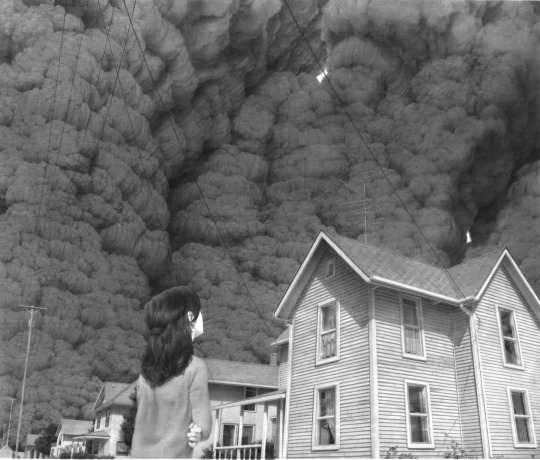Quote
I have made up thousands of stories; I have filled innumerable notebooks with phrases to be used when I have found the true story, the one story to which all these phrases refer. But I have never yet found that story. And I begin to ask, Are there stories?
Viginia Woolf, The Waves
159 notes
·
View notes
Quote
Listen to me. I am telling you a true thing. This is the only kingdom. The kingdom of touching; the touches of the disappearing, things.
Aracelis Girmay, “Elegy” from Kingdom Animalia (via literarymiscellany)
89 notes
·
View notes
Quote
“No human being possesses sureness of self, this can only mean being bounded and unbounded, selved and unsolved, 'sure' only of this untiring exercise. Then, this sureness of self, which is ready to be unsure, makes the laughter at the mismatch between aim and achievement comic, not cynical; holy, not demonic. This is not love of suffering, but the work, the power of love, which may curse, but abides. It is power to be able to attend, powerful or powerless; it is love to laugh bitterly, purgatively, purgatorially, and then to be quiet.”
Gillian Rose, Love’s Work
7 notes
·
View notes
Photo

Get to know Man Booker International Winner Laszlo Krasznahorkai (if you haven’t read him, try Satantango). (photo via Hadley Freeman)
31 notes
·
View notes
Quote
“His own opinion, which he does not air, is that the origins of speech lie in song, and the origins of song in the need to fill out with sound the overlarge and rather empty human soul.”
J.M. Coetzee; Disgrace (via wordpainting)
20 notes
·
View notes
Photo




illustrations from the story of antigone, ali smith
3K notes
·
View notes
Quote
To be contemporary is to respond to the appeal that the darkness of the epoch makes to us. In the expanding Universe, the space that separates us from the furthest galaxies is growing at such speed that the light of their stars could never reach us. To perceive, amidst the darkness, this light that tries to reach us but cannot – that is what it is to be contemporary. The present is the most difficult thing for us to live. Because an origin, I repeat, is not confined to the past: it is a whirlwind, in Benjamin's very fine image, a chasm in the present. And we are drawn into this abyss. That is why the present is, par excellence, the thing that is left unlived.
Giorgio Agamben, Verso interview with Jordan Skinner
8 notes
·
View notes
Photo

Robert Montgomery
3 notes
·
View notes
Photo

Dexter Dalwood, The Crash
1 note
·
View note
Quote
A Klee painting named “Angelus Novus” shows an angel looking as though he is about to move away from something he is fixedly contemplating. His eyes are staring, his mouth open, his wings are spread. This is how one pictures the angel of history. His face is turned towards the past. Where we perceive a chain of events, he sees one single catastrophe which keeps piling wreckage upon wreckage and hurls it in front of his feet. The angel would like to stay, awaken the dead, and make whole what has been smashed. But a storm is blowing from Paradise; it has got caught in his wings with such violence that the angel can no longer close them. This storm irresistibly propels him into the future to which his back is turned, while the pile of debris before him grows skyward. This storm is what we call progress.
Walter Benjamin, “Theses on the Philosophy of History” (via chocolate-eggs-and-lacan)
102 notes
·
View notes
Video
vimeo
'Homo Sacer', an installation for the exhibition "Science Fiction: New Death" at FACT, Liverpool.
booktwo.org/notebook/homo-sacer/
Homo Sacer consists of a series of phrases taken from British and international law; UN charters; agreements and treaties; as well as written and spoken statements by the British Government. Each of these concern the notion of citizenship: who has the right to belong where, and under what circumstances that right can be removed.
“The hologram is the ultimate 21st Century worker: fully virtualised, pre-programmed, untiring, spectacular. People stop and photograph them, marvel at their uncanny glow, and even when this reaction is one of bewilderment and disorientation, it is enough: the message gets through. But the hologram is a blank: you can’t talk back to it, it is the final conversion of discourse into direct power. A recorded announcement which tells you that this is how it is, with a digital smile”. - James Bridle
1 note
·
View note
Photo

James Bridle, ‘The Light of God’, 2012
“We call it in, and we’re given all the clearances that are necessary, all the approvals and everything else, and then we do something called the Light of God – the Marines like to call it the Light of God. It’s a laser targeting marker. We just send out a beam of laser and when the troops put on their night vision goggles they’ll just see this light that looks like it’s coming from heaven. Right on the spot, coming out of nowhere, from the sky. It’s quite beautiful.” - Omer Fast
'The Light of God’ is a laser targeting marker, which is used to direct hellfire missiles to their intended target.
540 notes
·
View notes
Photo



Cali Thornhill Dewitt, 2015
18 notes
·
View notes
Quote
And is there not also the case where we play and—make the rules up as we go along? And there is even one where we alter them—as we go along.
Wittgenstein, Philosophical Investigations
1 note
·
View note
Photo

Elad Kopler, Untitled, 2011
2 notes
·
View notes

